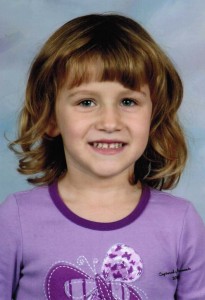
This August, Stacy Phillips of Pensacola, Fla. will see her daughter turn five and start her first day of kindergarten, enrolled in a mainstream class like other girls her age.
A year ago, she didn’t think that would be possible.
After Jane Phillips was born, an accumulation of fluid in her ear affected her hearing and left her with a speech impediment. As a result, when Phillips signed her up for Pre-K, she had to enroll in an exceptional education program.
But the staff at her daughter’s Pre-K center gave her a flyer about a new program for Florida’s early learners with special needs. The Specialized Instructional Services program, or SIS, allows parents to use funding from the state’s Voluntary Prekindergarten program for therapies or other services that support their educational needs.
In Jane’s case, it allowed her to see a speech therapist roughly 45 times to get the intensive help she needed to improve her verbal skills. “It moved her ahead so much faster,” Phillips said. And now, thanks to her progress, “she’s going to Kindergarten just as a regular student.”
In coming years, expect to hear a lot more about programs that give parents educational choices that go beyond deciding which school their children attend.
At the K-12 level, education savings accounts allow parents to use public money on a wide array of education-related services, rather than just tuition at a single school. Arizona created the first such program several years ago, and on Friday, Florida followed suit when Gov. Rick Scott signed into law a bill creating “personal learning scholarship accounts” for special-needs students.
SIS was quietly ahead of the curve.
The program was added to the state’s Voluntary Pre-K offerings in 2010 with the support of Sen. Andy Gardiner, R-Orlando – part of a package that expanded school choice options for students with disabilities. (Florida’s pre-K program, it’s worth noting, is the state’s biggest private school voucher program.)
Shan Goff, executive director of the state’s Office of Early Learning, said the program could help students whose conditions might prevent them from accessing the traditional Pre-K program, which the state constitution guarantees to every 4-year-old.
“You have kids who develop at different rates, and who have different needs, and this is, legislatively, another option for these families,” she said.
In Phillips’ case, her daughter was able to attend preschool, but the specialized services allowed her to supplement Jane’s public pre-K instruction. That made it possible for her to get completely caught up. Phillips said that number of sessions likely would have been out of reach for her otherwise.
“I was excited that I could take the funds and apply them directly to her need, which helped immensely,” she said.
A year ago, Jane rarely spoke. Now, Phillips said, “she tells her brothers what to do. She tells stories … I’m just amazed at the creativity.”
This was the second year of operation for the SIS program, which so far has been slow to attract participants. Just 38 participated statewide during the 2013-14 school year. Phillips, the first participant in Escambia County, said some of the paperwork was still marked “draft.”
Goff said the program has yet to find its market niche. And Phillips said there was sometimes confusion about her ability to use pre-K funds for services beyond the traditional preschool system.
The bigger picture, though, is clear: a movement towards greater customization in education.
In the 2012-13 school year, 26,611 special needs students in Florida received McKay scholarships to attend private schools. But the next wave of school choice will allow students with unique conditions to access services outside the school system.
The bill signed by Gov. Scott on Friday will allow parents of certain special-needs students in K-12 to access 90 percent of the funding a school district would have received for the student. The education accounts will be available to students with one of eight disabilities: autism, cerebral palsy, Down syndrome, intellectual disability, Prader-Will syndrome, Spina bifida, high-risk child, or Williams syndrome. The Legislature set aside $18.4 for the program for the 2014-15 school year.
Those children, with such severe developmental disabilities, face obstacles far different from what Jane was able to overcome so quickly. What unites them, though, is an acknowledgement that parents should have access to diverse options that allow their children to reach their full potential.


